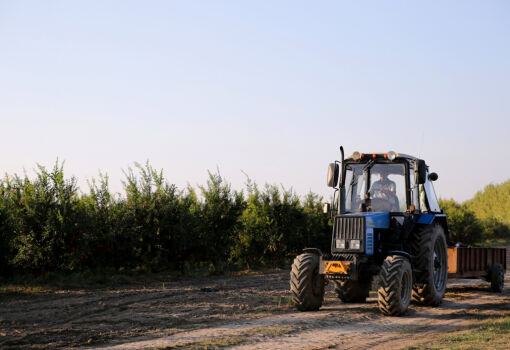
LP: – A year ago Tutun CTC produced the first batch of cigarettes ordered by PMI. How do you assess this partnership?
– We launched local production in a very short time – just four months. In 2022, the company was seriously affected by the disruption of logistics chains due to the closure of our factory in Kharkiv, from where cigarettes were supplied to Moldova. For a while, we received product from six different European PMI factories. However, technical analysis showed that local production is more profitable, and Tutun CTC is capable of producing up to 80% of our portfolio. Outsourced production is not a new practice for PMI: the company owns 53 factories, and another 32 are managed by third-party companies around the world.
In 2024, Tutun CTC set up production of PMI’s key brands. By the end of last year, already 40% of our turnover was produced at the Moldovan facility.
I would like to note that this partnership has become strategic for both parties, as well as for the entire tobacco market. The volume of investments in this project is estimated at $3 million. PMI specialists trained about 20 employees of the tobacco plant, and by the end of last year we had a professional team that will be able to cope with the ever-expanding product portfolio without any problems.
It is also important that foreign investments in this industry contribute to the growth of quality standards and contribute to the development of transparent working principles.
LP: – How has Moldovan tobacco outsourcing turned out in general?
– Tutun CTC has fully coped with the task, and if there were small technical barriers, it was due to the improvement of processes in PMI or adaptation to legislative changes.
For example, in 2025, a technical barrier arose with the issuance of excise stamps. From January 1, Moldova should have started optimizing the process of excise stamps and applying them according to new standards. That is, the design should be modified with a binding for each specific country of import. This would limit the possibility of uncontrolled release of large quantities of cigarettes “in stock”. But the process of issuing new stamps was delayed, and we encountered problems in production.
LP: – Are your Moldovan products intended only for domestic trade or can they be exported?
– So far we are oriented to the local market and cover its needs with 100% of our products. In the future, the production capacity of Tutun CTC allows us to increase our volumes up to 1 billion cigarettes per year. And this will potentially give us the opportunity to establish exports.
LP: – How has the Moldovan consumer reacted to PMI’s “made in Moldova”brands ?
– In general, the response to the local product is positive. It could hardly be different. The tobacco for production in Moldova comes from our factory in Poland, and the accompanying materials come from other companies in Western Europe. Therefore, the quality of Philip Morris brands produced in Moldova is no different from those produced at the company’s European factories.
When the market reacts positively, realizing that the quality bar has remained the same, it is even a certain element of national pride for us. It is clear that consumers of premium brands have a more reserved attitude: they have yet to dispel all doubts after the introduction of Marlboro into local production.
LP: – By refusing imports in favor of local production, you have significantly reduced the supply chain. How has this fact affected the final price: has it become lower?
– No, it did not affect the price, because due to the cost of energy resources the production in Moldova is more expensive than in Europe. On the one hand, we save money on logistics, on the other hand, we overpay for production.
Other factors speak in favor of local production, and the main one is time saving. Until 2024, we worked with six factories in Europe: taking into account all the stages, from the beginning of production of goods to its delivery to Moldova takes at least a month. Whereas the whole cycle of local production takes one week. We do not need to coordinate the sending of excise stamps to the factories, control logistics, coordinate customs clearance, etc. every time. – The whole process takes place at one plant.
LP: – National legislation provides for the introduction of a “Track and trace”system for tobacco products . How is this process progressing?
– As part of the announced investments, we have imported equipment for “Track and trace”, which will be installed at Tutun CTC. The employees of the factory traveled to Serbia for training. That is, the preparatory work has been done from our side.
The paradox of the situation is that the process of launching the system is suspended at the state level. Thus, according to the regulations adopted in 2023, 36 months were allocated for the implementation of “Track and trace”, of which one year was allocated for the development and publication of technical regulations, and two years – for the implementation of the project. We are one year away from the launch of the system, and the industry has yet to see the technical regulations.
If the implementation of the law is delayed, there are concerns that our equipment will need modification over time. Everything depends on how the local requirements will be spelled out. Therefore, the industry is in some tension.
LP: – What is the share of the shadow market in Moldova?
– According to IPSOS research, the level of illegal cigarette trade in September – October 2024 amounted to 9.8%, decreasing by 1.9 percentage points. Cigarettes of unknown origin or counterfeit brands (5.8%) most often fall into the shadow market. Cigarettes without excise stamps account for another 3%.
For legal business, the trend is positive: this is the first reduction in the last three years. This proves the effectiveness of government policy and the importance of a predictable and transparent business environment.
However, we do not know what is happening in the e-cigarette market: this trade is uncontrolled and unfolds through social networks.
LP: – Is the Moldovan tobacco market growing or falling? What do the three major players look like?
– The market is rather stable. Last year it grew insignificantly, mainly because of the war situation: more Ukrainians started to pass through Moldova and stay here. In general, taking into account the latest census, we can say that there are about half a million adult smokers in Moldova now.
As for the top 3 operators, they are Philip Morris, JTI and Tutun CTC. I would like to note that in 2024 our imports of cigarettes increased by 8% and the supply of sticks by 11%.
In 2024, the total payments of the tobacco business to the state budget amounted to about 5.4-5.5 billion lei. Of these, Philip Morris provided 2.1 billion, which is 21.3% more than in 2023.
LP: – You are not limited to imports, working as a full-fledged business structure. How does this affect your budgets in Moldova?
– Yes, Philip Morris is not just an importer. Since the launch of tobacco heating systems in Moldova, we started to develop a network of specialized stores to provide quality service. At the same time, our team has grown and we have created over 100 jobs. In addition, we cooperate with more than 580 companies that provide services in distribution and sales, rent of premises, maintenance and technical support of outlets, consulting, printing, etc. In 2024, our payments under these contracts amounted to approximately MDL 430 million.
For comparison: in 2023 we had 140 contracting companies, and their services cost us 142 million lei. In other words, the budget has increased more than three times.
LP: – Is your trade network with smokeless products growing, and how is the product portfolio changing?
– Last year, we increased our branded trade to nine specialized stores selling tobacco heating devices.
Also in 2024, the company launched an innovative product, an updated version of its flagship Iqos Iluma tobacco heating device for adult smokers and nicotine users. The new development is the result of Philip Morris International’s efforts and investments in science and technology, reflecting the company’s commitment to a smokeless future.
Thus our investment in tobacco alternatives in Moldova continues. It took us about $2 million to introduce and support this technology in the Moldovan market.
This is a concept that PMI is pursuing in all countries. By the end of 2024, the company’s investment in science, research and development of smokeless devices amounted to $14 billion. Our smokeless category is available in 95 markets, where about 32 million smokers have switched from cigarettes to heated tobacco.
In the fourth quarter of 2024, smokeless products accounted for 40% of the company’s net revenue. And in PMI’s top 5 markets, the figure was 60%.
LP: – Giant companies often focus on eco-processes. What exactly are you doing for sustainable development?
– We strive to reduce the impact of our activities on the environment, to solve the issue of energy dependence. In this context, Philip Morris Moldova and the distribution company Acvilin-Grup have installed solar panels on the roof of their warehouses, which cover 100% of the companies’ energy needs.
Also, eco-projects related to our smokeless category continue – collection of broken electronic devices, which are sent for recycling and further used in production. In addition, a tobacco stick collection program was launched. We encourage Moldovan consumers not to throw away used sticks, but to collect them in a special bag and return them to retail outlets.
It is important for PMI Moldova not only to realize its business interests, but also to contribute to the development of the country – as a major taxpayer, a responsible employer, a supporter of sustainable development principles, as well as technology and innovation.

